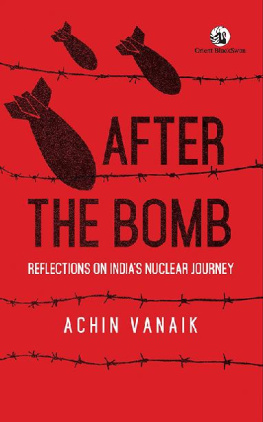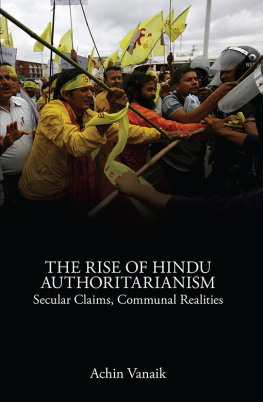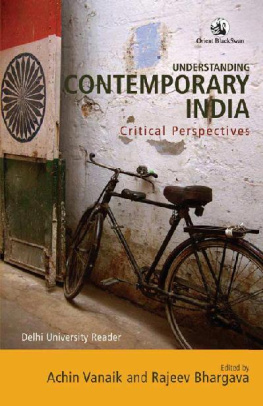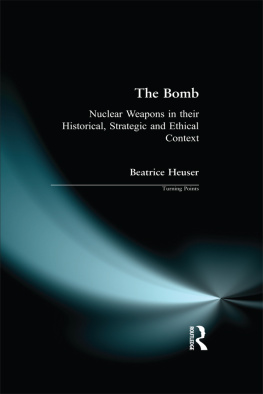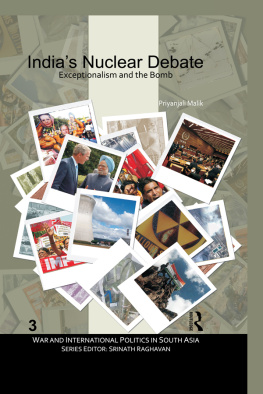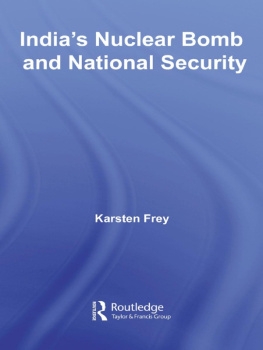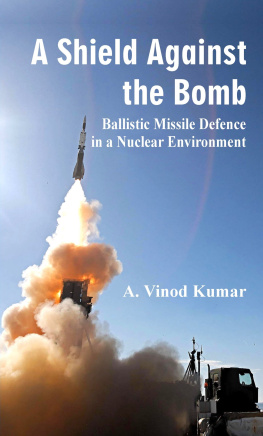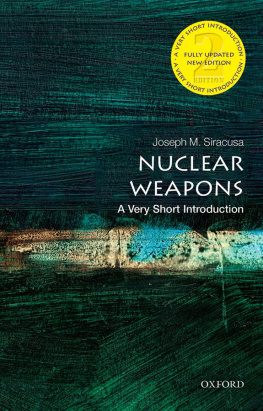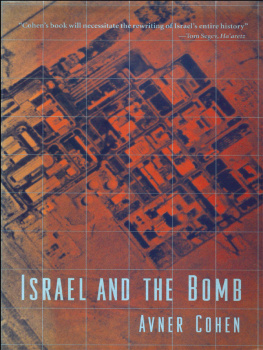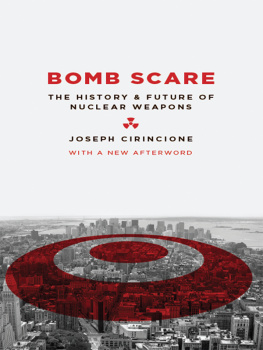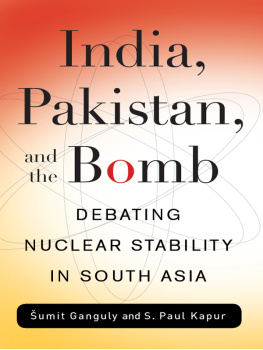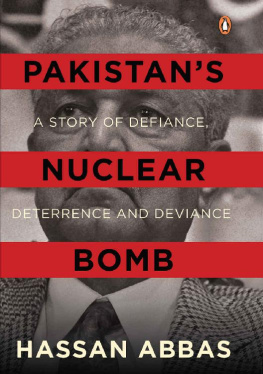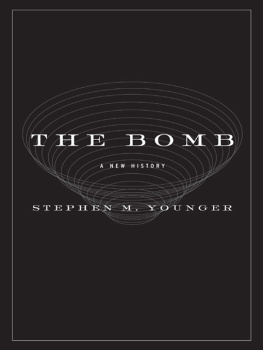Achin Vanaik - After the Bomb: Reflections on India’s Nuclear Journey
Here you can read online Achin Vanaik - After the Bomb: Reflections on India’s Nuclear Journey full text of the book (entire story) in english for free. Download pdf and epub, get meaning, cover and reviews about this ebook. year: 2015, publisher: Orient Blackswan, genre: Politics. Description of the work, (preface) as well as reviews are available. Best literature library LitArk.com created for fans of good reading and offers a wide selection of genres:
Romance novel
Science fiction
Adventure
Detective
Science
History
Home and family
Prose
Art
Politics
Computer
Non-fiction
Religion
Business
Children
Humor
Choose a favorite category and find really read worthwhile books. Enjoy immersion in the world of imagination, feel the emotions of the characters or learn something new for yourself, make an fascinating discovery.
- Book:After the Bomb: Reflections on India’s Nuclear Journey
- Author:
- Publisher:Orient Blackswan
- Genre:
- Year:2015
- Rating:5 / 5
- Favourites:Add to favourites
- Your mark:
- 100
- 1
- 2
- 3
- 4
- 5
After the Bomb: Reflections on India’s Nuclear Journey: summary, description and annotation
We offer to read an annotation, description, summary or preface (depends on what the author of the book "After the Bomb: Reflections on India’s Nuclear Journey" wrote himself). If you haven't found the necessary information about the book — write in the comments, we will try to find it.
Achin Vanaik: author's other books
Who wrote After the Bomb: Reflections on India’s Nuclear Journey? Find out the surname, the name of the author of the book and a list of all author's works by series.
After the Bomb: Reflections on India’s Nuclear Journey — read online for free the complete book (whole text) full work
Below is the text of the book, divided by pages. System saving the place of the last page read, allows you to conveniently read the book "After the Bomb: Reflections on India’s Nuclear Journey" online for free, without having to search again every time where you left off. Put a bookmark, and you can go to the page where you finished reading at any time.
Font size:
Interval:
Bookmark:
"Permanent Black" in store.
THE BOMB


THE BOMB


Mike Marqusee
3-6-752 Himayathnagar,Hyderabad
500 029 (Telangana), INDIA
e-mail:
Bangalore, Bhopal, Chennai, Guwahati
Hyderabad, Jaipur, Kolkata, Lucknow
Mumbai, New Delhi, Noida, Patna, Vijayawada
www.orientblackswan.com
Orient Blackswan Private Limited
3-6-752 Himayathnagar,Hyderabad
500 029 (Telangana), INDIA
e-mail:
Dangers Old and New
of India
of Stability in South Asia
Two Nuclear Strategists from the US and India
The Rajiv Gandhi Action Plan Updated
Going beyond the NPT
Pursuing Restraint and Disarmament
This book puts together revised and updated pieces written over the post-Pokharan II years as well as never before published pieces. Earlier versions of Chapters 1, 3, 6 and a very small part of Chapter 4 appeared in the EPW whose generous attitude to the dissemination of knowledge precludes them from demanding any restrictions on reproduction, amended or otherwise. For that reason alone I wish to give acknowledgements to them. Thanks are also due to Little Magazine where I first explored in a more systematic fashion what has been presented here as the Ten Dilemmas of Nuclear Deterrence. No work of this kind is ever the fruit of solitary splendour even if the actual writing takes place in lonelier circumstances. It is my engagement with the writings of, and conversations with many people, including like-minded activists in several countries, that has equipped me with whatever degree of merit or otherwise to write as I have. There are many people therefore that I have to thank. Within CNDP, I owe many debts to Anil Chaudhury, Wilfred DCosta, Itty Abraham, Kamal Mitra Chenoy, Praful Bidwai, Amarjit Kaur, S. P. Uday Kumar, N. D. Jayprakash, Kumar Sundaram, Suvrat Raju, Admiral Ramdas, Lolly Ramdas, Sukla Sen, Vivek Sundara, Ilina Sen, Jean Dreze, Ramesh Sharma, Dahlia Kar, Anuradha Sen, Kavita Srivastava, Prakash Meghe, Utkarsh Sinha, Satyajit Rath, Vinita Bal, Anna George. I am particularly grateful to M. V. Ramana for drawing my attention to valuable reference sources which I would have otherwise neglected. To my friends from Pakistan, Karamat Ali, Pervez Hoodbhoy, Zia Mian, Abdul Nayyar, B. N. Kutty go my grateful thanks and appreciation for their ongoing commitments and writings which have informed and inspired. Special thanks must go to the anonymous reviewer who highlighted deficiencies that I have then sought to rectify. I am, of course, solely responsible for those remaining.
I have, over the years, learnt much from Masa Takubo, Akira Kawasaki, Keiji Fujiwara, Hiro Umebayashi, Kazuya Nakamizo and Chiharu Takenaka in Japan; from Rebecca Johnson, Kate Hudson, Bruce Kent in the UK; from Xanthie Hall, John Burroughs, Joseph Gerson, Arjun Makhijani, Alice Slater, Jackie Cabasso, Andrew Lichterman in the US; from Alyn Ware, Kate Dewes and Robert Green in New Zealand. Closer home there is Pamela, Anish, Samar, Suresh and Bali.
But special mention must be made of Mike Marqusee whom I first met some 25 years ago and only wish I had known for decades before. Through him I met Liz Davies, his remarkable companion who has done outstanding work in the field of housing rights in Britain and who brings honour more generally to the legal profession through her determination to provide whatever legal help she can to the poor and downtrodden. Both Liz and Mike have been staunch advocates for Britains unilateral nuclear disarmament. Mike has been a special influence on me and my family through his wonderful writings, the many conversations during times spent together as well as in the occasional struggles collectively waged despite his being based in England and myself in India. His writings have spanned a whole range of concerns from popular culture to radical politics and history to public health to poetry, aesthetics and sport. For his courage in adversity and sickness, his deep political commitment, his innate sensitivity and goodness and for his abiding friendship, I dedicate this book to him in love and admiration.
Delhi
ABM | Anti-Ballistic Missile |
Font size:
Interval:
Bookmark:
Similar books «After the Bomb: Reflections on India’s Nuclear Journey»
Look at similar books to After the Bomb: Reflections on India’s Nuclear Journey. We have selected literature similar in name and meaning in the hope of providing readers with more options to find new, interesting, not yet read works.
Discussion, reviews of the book After the Bomb: Reflections on India’s Nuclear Journey and just readers' own opinions. Leave your comments, write what you think about the work, its meaning or the main characters. Specify what exactly you liked and what you didn't like, and why you think so.

